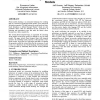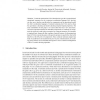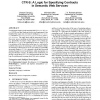855 search results - page 104 / 171 » Using First-Order Logic to Reason about Policies |
SIGSOFT
2005
ACM
14 years 9 months ago
2005
ACM
Fluent model checking is an automated technique for verifying that an event-based operational model satisfies some state-based declarative properties. The link between the event-b...
SCP
2010
13 years 7 months ago
2010
Constraint automata have been introduced to provide a compositional, operational semantics for the exogenous coordination language Reo, but they can also serve interface specifica...
WWW
2004
ACM
14 years 9 months ago
2004
ACM
A requirements analysis in the emerging field of Semantic Web Services (SWS) (see http://daml.org/services/swsl/requirements/) has identified four major areas of research: intelli...
LICS
2009
IEEE
14 years 3 months ago
2009
IEEE
A psi-calculus is an extension of the pi-calculus with nominal data types for data structures and for logical assertions representing facts about data. These can be transmitted be...
FMCO
2007
Springer
14 years 3 months ago
2007
Springer
This article considers the coordination language Reo, a Petri net variant called zero-safe nets, and intuitionistic temporal linear logic (ITLL). The first part examines the seman...



